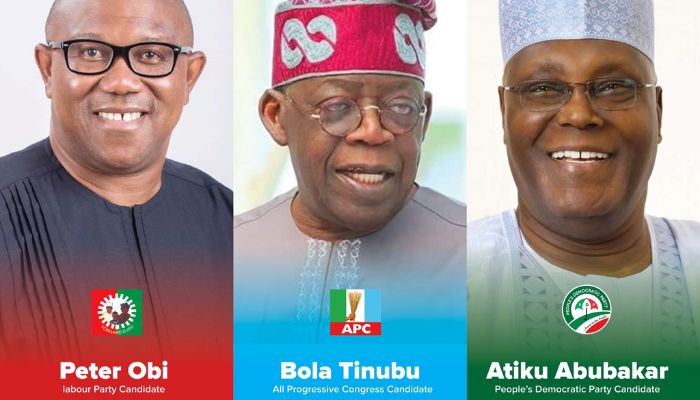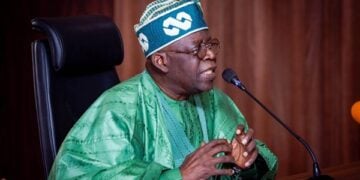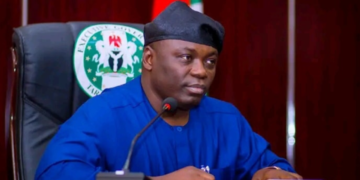Ahead of the 2023 presidential election and three months after the 18 registered political parties chose their presidential candidates, September can be described as the month of polls. Four major polls results came out predicting the possible outcome of the 2023 presidential election that got many Nigerians talking.
Since the first ever opinion poll which was tallies of voter preferences reported on Telegram Messenger to the 1824 presidential election, showing Andrew Jackson leading John Quincy Adams by 335 votes to 169 in the contest for the United States Presidency, opinion polls have become part of democracy, especially in United States, where Nigeria copied its presidential system of government.
In keeping with this democratic tradition on September 14, ANAP Foundation released its opinion poll on the 2023 presidential election which showed that Peter Obi of Labour Party was holding a significant lead over both Bola Ahmed Tinubu of the ruling All Progressives Congress (APC) and Atiku Abubakar of the Peoples Democratic Party (PDP).
In the nationwide poll Obi stands at 21 percent while both Tinubu and Atiku are tied in second place with 13 percent each.
Kwankwaso of the NNPP was at a distant fourth with only 3 percent.
The survey by NOI Polls, the leading polling services firm for country-specific polling in West Africa, also indicated that a considerably high proportion of Nigerians young and old are angling to vote in February’s election.
ANAP Foundation has traditionally organised political opinion polls ahead of each of the presidential elections since 2011 which are conducted by NOI Polls. The poll results were released by ANAP’s founder, Atedo Peterside. He said this recent nationwide opinion poll was concluded in early September 2022 with each of the respondents asked the same question: “Suppose the presidential election is being conducted today, who are you likely to vote for?”
Reacting to the poll, the APC Presidential Campaign Council said the flag-bearer of the party, Tinubu, was unperturbed. In a statement by Bayo Onanuga, director, media and publicity, it described the poll as “dubious, unrealistic and inconsistent.” Onanuga said that the NOI Polls made wild and incredible permutations on the presidential elections.
While speaking on Channels Television’s Politics Today, the spokesperson of the Atiku Abubakar presidential campaign Daniel Bwala, “questioned the techniques deployed for the exercise, claiming Obi is basking in the euphoria of hallucination”. Bwala insisted that a “normal poll that will attract credibility will be a poll that will clearly release the sample size and the margin of error as the report is being released because the sample size and the margin of error will help in identifying whether the polling was actually carried out correctly or not.”
Also reacting, Rabiu Kwankwaso Campaign Council described the poll result by ANAP Foundation and its projections as “self-seeking, self-serving, misleading, inaccurate and laced with partisanship.” In a statement to the media, spokesperson of the council, Ladipo Johnson, questioned the sampling methods of the data collection.
LEADERSHIP findings however showed that the presidential election opinion polls conducted for ANAP foundation in 2015 and 2019 clearly said the then candidate of the APC Muhammadu Buhari had a better chance of winning the last two presidential elections.
The two polls were conducted by NOI polls, the same company that conducted the September 2022 presidential poll with Peter Obi leading but which generated controversy since the results were released by Atedo Peterside. The successes of NOI in accurate polling in previous elections was also confirmed by the chief executive officer of NOI Poll Ltd, Dr Chike Nwangwu while appearing on Channels TV to defend the poll outcome.
Less than two weeks after the NOI/ANAP Foundation poll another poll was conducted of registered voters by the We2Geda Foundation to deepen the conversation about the country’s 2023 elections and to help political analysts address critical issues such as candidate preferences and key socioeconomic dynamics at play in the upcoming elections.
A statement from the foundation signed by Ibrahim Abdulkareem Muna Obioha explained that the proportion of Nigerians polled from each state was equal to the state’s contribution to the national voters’ register, as published by INEC. The statement said, “The result of the WE2Geda poll showed a clear lead for the Labour Party (LP) presidential flag-bearer, Mr Peter Obi, with 51 per cent of respondents suggesting voting for him as their preferred candidate if the presidential election were held today.”
Twenty-five per cent suggested voting for Atiku, while Tinubu ranked third in the voter preference poll with 19 per cent.
Meanwhile, on September 27, The Economist Intelligence Unit (EIU), an arm of The Economist of London, predicted victory for Tinubu. According to Business Day, EIU made the prediction in a new country report.
The UK-based platform, in the country report, said the controversy of the Muslim-Muslim presidential ticket will not affect Tinubu’s chances in the elections.
“We expect Tinubu to take the presidency, and recent developments have only reinforced our thinking. It does not appear that a Muslim-Muslim ticket will weigh significantly on Tinubu’s electoral chances,” EIU said.
On the chances of Atiku at the polls, the EIU country report said the PDP has cause to worry over the feud with Nyesom Wike, governor of Rivers State and Obi balkanising the traditional votes of the PDP in the south-east.
Aside The Economist Intelligence Unit (EIU), another foreign media organization, Bloomberg, published its poll on September 28. It reported that a clear majority of respondents said they intend to vote for Obi. The results of the survey conducted for Bloomberg News by Premise Data Corp. were published as the official campaign to succeed President Muhammadu Buhari kicked off.
Of the 92% of participants who said they’ve decided how to vote, 72% named Obi as their first choice. Of those who are still unsure, 45% said the 61-year-old is their preferred candidate.
The San Francisco-headquartered data company surveyed 3,973 Nigerians from Sept. 5-20. Respondents to the app-based poll were selected from quotas developed by age, gender and location across the country’s six geopolitical zones.
Results were then weighted against the original quotas to ensure national representation. About 44% of Nigerians own smartphones, according to the Alliance for Affordable Internet. The candidates of the two parties that have ruled Nigeria since the restoration of democracy in 1999 fared less well. Bola Tinubu of the ruling All Progressives Congress garnered 16% of decided voters and 23% of those yet to make up their minds. Atiku Abubakar of the main opposition Peoples Democratic Party tallied 9% and 17% respectively.
It is expected that as Nigeria gets closer to the 2023 presidential election more opinion polls would be conducted. However it will be difficult to conduct pre-election polls that would be accepted by all no matter how scientific it may seem.





